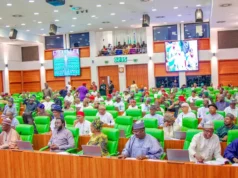The CBN‘s new fiscal guidelines for 2024–25 reduced the cybersecurity levy on electronic transactions from 0.5 percent to 0.005 percent.
This reduction follows the controversial introduction of the levy earlier in the year, which was met with opposition from both the Nigeria Labour Congress, Trade Union Congress, and bank customers.
“The CBN shall continue to enforce the payment of the mandatory levy of 0.005 percent on all electronic transactions by banks and other financial institutions, by the Cybercrime (Prohibition, Prevention, etc.) Act, 2015.”
The levy, introduced under the Cybercrime (Prohibition, Prevention, etc.) Act 2015, amended in 2024, is set to support the National Cybersecurity Fund, administered by the Office of the National Security Advisor. The 0.005 percent fee will be charged on all electronic transactions conducted by commercial, merchant, non-interest, and payment service banks, among others.
In a directive issued by the CBN on Wednesday, certain transactions will be exempt from the levy, including wage payments, loan disbursements and repayments, and transfers between the same bank accounts or banks for the same client. The exclusion also covers intra-bank transfers, clearing and settlement of cheques, letters of credit, and transactions between banks and the CBN.
Earlier in May, President Bola Tinubu ordered a suspension and review of the levy due to widespread protests, and the House of Representatives also demanded its immediate withdrawal. Despite the backlash, the CBN announced it would continue with the levy under the revised rate as part of its monetary and exchange policy for the next fiscal years.










